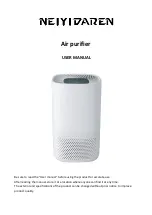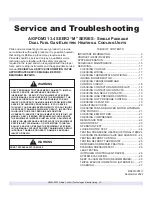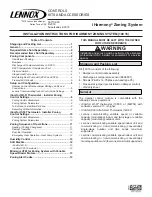
18
8. Electrical work
8.4. Function settings (Function selection via the
remote controller)
8.4.1 Function setting on the unit (Selecting the unit functions)
1) Changing the external static pressure setting
[Fig. 8-20] (P.8)
Ⓐ
Hour button
Ⓑ
Minute button
Ⓒ
TEMP button
Ⓓ
TEMP button
Ⓔ
ON/OFF button
Ⓕ
CHECK button
•
Be sure to change the external static pressure setting depending on the duct and
the grill used.
①
Go to the function select mode
Press the CHECK button
Ⓕ
twice continuously.
(Start this operation from the status of remote controller display turned off.)
CHECK
is lighted and “00” blinks.
Press the TEMP button
Ⓒ
once to set “50”. Direct the wireless remote controller
toward the receiver of the indoor unit and press the Hour button
Ⓐ
.
②
Setting the unit number
Press the TEMP button
Ⓒ
and
Ⓓ
to set the unit number to 01-04 or 07. Direct
the wireless remote controller toward the receiver of the indoor unit and press
the Minute button
Ⓑ
.
③
Selecting a mode
Enter 08 to change the external static pressure setting using the
Ⓒ
and
Ⓓ
buttons.
Direct the wireless remote controller toward the receiver of the indoor unit and
press the Hour button
Ⓐ
.
Current setting number:
1 = 1 beep (one second)
2 = 2 beeps (one second each)
3 = 3 beeps (one second each)
④
Selecting the setting number
Use the
Ⓒ
and
Ⓓ
buttons to change the external static pressure setting to be
used.
Direct the wireless remote controller toward the sensor of the indoor unit and
press the Hour button
Ⓐ
.
⑤
To set the external static pressure
Repeat steps
③
and
④
to set the mode number to 10.
⑥
Complete function selection
Direct the wireless remote controller toward the sensor of the indoor unit and
press the ON/OFF button
Ⓔ
.
External static
pressure
Setting no. of mode
no. 08
Setting no. of mode
no. 10
05 Pa
1
2
15 Pa (before shipment)
1
1
35 Pa
2
1
50 Pa
3
1
Note:
•
Whenever changes are made to the function settings after installation or
maintenance, be sure to record the changes with a mark in the “Check”
column of the Function table.
2) Other functions
①
Select unit number 00 for the settings. (Settings for all indoor units)
Refer to Function table 1.
②
Select unit number 01 to 04 or 07 for the settings. (Settings for each indoor unit)
To set the indoor unit in the individual system, select unit number 01.
To set each indoor unit of two, three or four indoor units, which are connected
when these units are simultaneously in operation, select unit number 01 to 04.
To set all indoor units of two, three or four indoor units which are connected
when these units are simultaneously in operation, select 07.
Refer to Function table 2.
Function table 1
Select unit number 00
Mode
Settings
Mode no.
Setting no. Initial setting
Check
Power failure automatic recovery
(AUTO RESTART FUNCTION)
Not available
01
1
*2
Available *1
2
*2
Indoor temperature detecting
Indoor unit operating average
02
1
〇
Set by indoor unit’s remote controller
2
Remote controller’s internal sensor
3
LOSSNAY connectivity
Not Supported
03
1
〇
Supported (indoor unit is not equipped with outdoor-air intake)
2
Supported (indoor unit is equipped with outdoor-air intake)
3
Function table 2
Select unit numbers 01 to 04 or all units (AL [wired remote controller]/07 [wireless remote controller])
Mode
Settings
Mode no.
Setting no. Initial setting
Check
Filter sign
100 Hr
07
1
2500 Hr
2
No filter sign indicator
3
〇
External static pressure
15 Pa
08
1
〇
35 Pa
2
50 Pa
3
The same as setting of mode no. 08
10
1
〇
5 Pa (set mode no. 08 to 1)
2
*1 When the power supply returns, the air conditioner will start 3 minutes later.
*2 Power failure automatic recovery initial setting depends on the connecting outdoor unit.
Note:
When the function of an indoor unit were changed by function selection after the end of installation, always indicate the contents by entering a
〇
or other mark in
the appropriate check filed of the tables.
9. Test run
9.1. Before test run
▶
After completing installation and the wiring and piping of the indoor and
outdoor units, check for refrigerant leakage, looseness in the power supply
or control wiring, wrong polarity, and no disconnection of one phase in the
supply.
▶
Use a 500-volt megohmmeter to check that the resistance between the
power supply terminals and ground is at least 1.0 MΩ.
▶
Do not carry out this test on the control wiring (low voltage circuit) terminals.
Warning:
Do not use the air conditioner if the insulation resistance is less than 1.0 MΩ.
Insulation resistance
After installation or after the power source to the unit has been cut for an extended
period, the insulation resistance will drop below 1 MΩ due to refrigerant accumulating
in the compressor. This is not a malfunction. Perform the following procedures.
1. Remove the wires from the compressor and measure the insulation resistance of
the compressor.
2. If the insulation resistance is below 1 MΩ, the compressor is faulty or the
resistance dropped due the accumulation of refrigerant in the compressor.
3. After connecting the wires to the compressor, the compressor will start to warm
up after power is supplied. After supplying power for the times indicated below,
measure the insulation resistance again.
•
The insulation resistance drops due to accumulation of refrigerant in the
compressor. The resistance will rise above 1 MΩ after the compressor is
warmed up for two to three hours.
(The time necessary to warm up the compressor varies according to
atmospheric conditions and refrigerant accumulation.)
•
To operate the compressor with refrigerant accumulated in the compressor, the
compressor must be warmed up at least 12 hours to prevent breakdown.
4. If the insulation resistance rises above 1 MΩ, the compressor is not faulty.
Caution:
•
The compressor will not operate unless the power supply phase
connection is correct.
•
Turn on the power at least 12 hours before starting operation.
- Starting operation immediately after turning on the main power switch can
result in severe damage to internal parts. Keep the power switch turned on
during the operational season.
Содержание Mr. Slim SEZ-M25DAL
Страница 21: ......





































